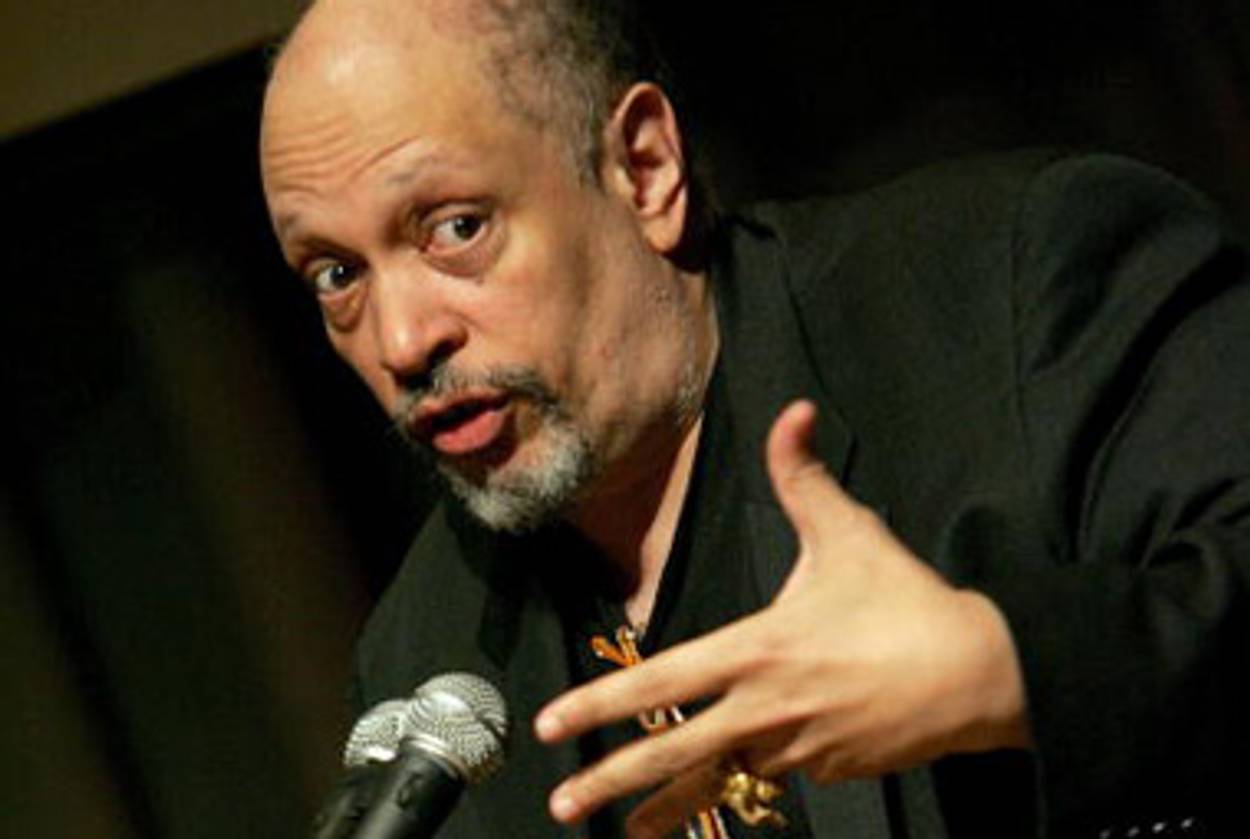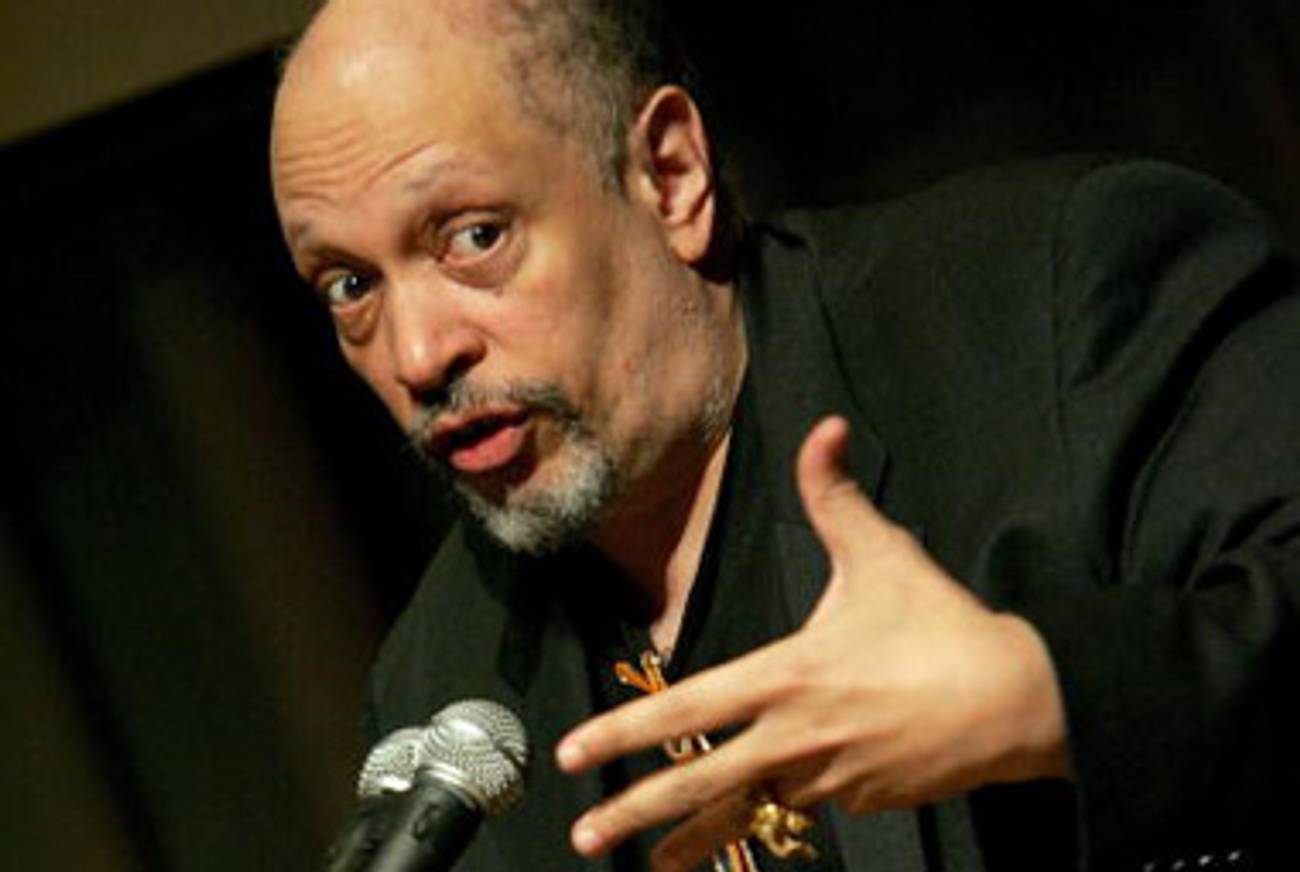Easy Call
A case for Walter Mosley’s inclusion in the American Jewish literary canon




Walter Mosley, who last month published Known To Evil, his latest crime novel, fits neatly into a number of categories. He is an African-American writer, a mystery writer, a literary novelist, an award-winner, a polemicist, and a best-selling author. But he has not yet been included in the American Jewish canon, either through serious scholarly consideration or by inclusion in relevant anthologies.
By any rabbinic standard, Mosley, the son of an African-American father and Jewish mother, is Jewish. “If you ask me what I am, I would say I’m a black man in America and I’m a Jew,” he told me in an interview last year. “My mother’s a Jew and that makes me a Jew. That means they would take me in Israel.”
I contributed to a critical companion to contemporary Jewish American novelists that was published in 1997. Mosley wasn’t included. “It doesn’t bother me because I understand,” he told me. “You have Jewish thinkers who wouldn’t include me, because they see Jews in America as white people in America”—that is, as part of the dominant culture—“forgetting all the golf courses, forgetting all the jokes, forgetting all the things that they must know people are saying and thinking all the time and allowing to happen, forgetting America’s history in World War II.”
I asked Joel Shatzky, a professor who served as co-editor of that critical companion, why Mosley had been omitted. The book “concerned itself with Jewish writers that wrote predominantly on Jewish themes,” he responded by email. “Mosley is a terrific writer but not, as far as I know, a Jewish one.”
So, what is a Jewish writer, and what is a Jewish theme? If a writer is unambiguously Jewish, doesn’t it follow that any story he or she commits to paper contains, by definition, Jewish themes, whether that story involves bubbe telling shtetl folktales over a steaming pot of chicken soup, or a black detective in Los Angeles living in the 1950s?
Mosley doesn’t write about bubbes. “I write about Black male heroes,” he said. “There’s really nobody in America writing about Black male heroes.”
Fair enough. But that doesn’t exclude the possibility of a profoundly Jewish dimension in his work. Jewish characters and culture are peppered throughout his oeuvre. His novel Fearless Jones revolves around Holocaust survivors and covert Israeli agents operating in the undercurrents of Los Angeles. Easy Rawlins, Mosley’s most famous hero, is assisted in several stories by the sympathetic Jewish detective Saul Lynx. Ben Dibbuk, the protagonist of Mosley’s novel Diablerie, is every inch a classic Dibbuk out of Yiddish folklore, a demonic figure inhabiting a human body. The elderly Jewish character of Chaim Zetel in Mosley’s The Right Mistake occupies a prominent place within the philosophic discussions of the novel’s protagonist, Socrates Fortlow, and Zetel’s work in “finding things that no one wants and making them into something useful” becomes a guiding metaphor for the broader agenda of the novel.
Jewish culture, together with black culture and the American collisions between different cultures, permeate every page of Mosley’s work. (In our interview, Mosley described his books as a “confluence” of cultures.) And while it might be difficult to argue that Mosley’s themes are exclusively Jewish, it would be equally difficult to argue that Jewish themes are not present in his work. Zetel’s work repairing broken objects is a clear reference to the Jewish concept of tikkun olam, or healing the world. Indeed, Mosley’s stories consistently and relentlessly arch toward redemption, toward healing a deeply broken world.
His polemics, as articulated in such nonfiction volumes as A Life Out of Context and What Next: A Memoir Toward World Peace, speak to the African American experience, but they adopt an anarchistic political posture that seems to have evolved directly out of the Jewish North American leftist experience of the 1930s. His novels, like those of Mordecai Richler, consistently contain characters who hearken back to the Jewish folkloric Golem, a supernatural protector, fashioned from clay using kabbalistic practice; these characters, like Raymond “Mouse” Alexander of the Easy Rawlins novels, Fearless Jones, and Hush (the hit man in Mosley’s new Leonid McGill series), are protectors who cross the line of morality in order to maintain balance in the world. Paris Minton, the narrator of the Fearless Jones novels, clearly evolved from of the tradition of the laughable schlemiel. And the best of Mosley’s protagonists, like those of Saul Bellow, Bruce Jay Friedman, and so many other Jewish writers, are wanderers, jarred by a feeling of displacement in America, whether they are Jewish or otherwise.
Stories of Jews living side-by-side with other American cultures, including black culture, and the ambiguities that arise from that proximity, might provide the ultimate American Jewish theme—that lines are blurred and blurring. “Jews at one point were the best boxers in America,” Mosley said to me. “Jews were the best mobsters in America. Jews lived in ghettos and were slaughtered because of their race. I dare anybody to separate that from the African American experience. It’s not possible.”
The question remains: Why would the Jewish literary establishment in America not want to claim Mosley as a member of the canon? Mosley says that his inclusion would challenge the myth that Jews belong to white America. But perhaps the truth is simpler; perhaps it’s just an oversight, and it’s now time to include him in all serious considerations of the American Jewish canon. Or perhaps the collision of Jewish themes with black themes in his work has complicated the question of what is Jewish writing, and no critic or anthologist has been prepared to accept the ambiguity.
Mosley suggested in our interview that “to say ‘what’s the Jewish part of this book, what’s the black part of this book’ is actually missing the point of the book in a way. For me, this is absolutely smooth sailing.” It’s time for Jewish anthologists and critics to discover that ambiguity itself is becoming the ultimate Jewish American theme.
Harold Heft, Director of Research and Innovation at North York General Hospital, has taught literature and film at the University of Western Ontario and the Hebrew University of Jerusalem.
Harold Heft, Director of Research and Innovation at North York General Hospital, has taught literature and film at the University of Western Ontario and the Hebrew University of Jerusalem.